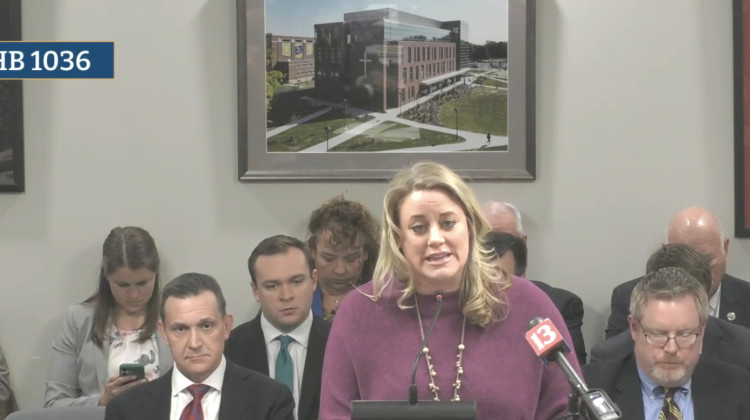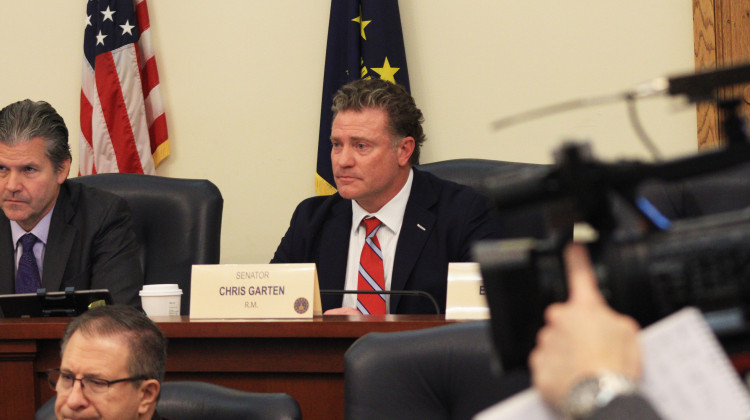
These rules only apply to agreements entered after July 1, 2023, as was the case for the original proposed ban.
Lauren Chapman/IPB NewsIndiana House lawmakers passed their version of a bill Monday to restrict non-compete agreements on physicians. But some lawmakers say they preferred the original bill, which fully banned such agreements.
The House version of Senate Bill 7 still partly bans new non-compete agreements, but only on primary care doctors.
Other physicians can still be subject to a non-compete. However, the House added restrictions to nullify the agreements if an employer terminates a doctor without cause, the doctor completes their employment contract term or quits “for cause.”
The bill does not define “for cause,” so it’s currently not clear which reasons a doctor might have for quitting that would qualify them to be freed from a non-compete.
READ MORE: IU School of Medicine awarded grant to tackle a looming shortage of primary care doctors
Rep. Ryan Hatfield (D-Evansville) argued the ban on non-competes for primary care goes too far. He unsuccessfully tried to amend the bill to remove that part.
“Senate Bill 7, in its current form, disproportionately impacts rural health hospitals in a negative way. The bill only prohibits non-compete contracts for primary care providers, which are a majority of the physicians that rural hospitals hire,” Hatfield said. “Removing the prohibition on primary care non-competes will put all physicians on the same level.”
Rep. Ethan Manning (R-Denver) said he agreed physicians should be on the “same level,” but would have preferred achieving that by banning non-compete agreements for all specialties – as SB 7 originally did.
“But our committee, after a couple of attempts, we came to what was a good compromise,” Manning said. “Primary care physicians, they're compensated less, so they have fewer resources to litigate or mediate or pay for a buyout. And … they're generally the people you think of immediately when you talk about doctors and health care. They are the doorkeepers to the health care world of services for millions of Hoosiers. And so we'd like to protect them.”
Join the conversation and sign up for the Indiana Two-Way. Text "Indiana" to 73224. Your comments and questions in response to our weekly text help us find the answers you need on statewide issues throughout the legislative session. And follow along with our bill tracker.
The House also added language to bolster a 2020 law that required physician non-compete agreements to have a “reasonable buyout provision.” Buyouts allow people to purchase their way out of a non-compete agreement.
But, the law never clarified what “reasonable” meant and didn’t set up any method to decide whether a buyout met that standard. That means the primary way to challenge a buyout based on the reasonableness standard is by suing and letting a judge decide.
The bill still doesn’t define what “reasonable” means, but it gives physicians and their employers the ability to go to a mediator to determine whether a buyout meets that standard, rather than leaving arbitration as the main avenue for that.
These rules only apply to agreements entered after July 1, 2023, as was the case for the original proposed ban.
The House passed the bill 81-17, with a mixture of lawmakers from both parties on either side.
SB 7 heads back to the Senate. The chamber can either accept the changes and send the bill to the governor’s desk or reject them and force members of both chambers to come together and potentially amend the bill further before it can advance.
The bill’s author, Sen. Justin Busch (R-Fort Wayne), told the House committee responsible for the changes to SB 7 that he would “ take that back from my body and encourage them to concur this bill.”
A few members of the committee expressed concern that Busch wasn’t making a strong enough commitment.
Adam is our labor and employment reporter. Contact him at arayes@wvpe.org or follow him on Twitter at @arayesIPB.
9(MDAyMzk1MzA4MDE2MjY3OTY1MjM5ZDJjYQ000))
 DONATE
DONATE






 Support WFYI. We can't do it without you.
Support WFYI. We can't do it without you.